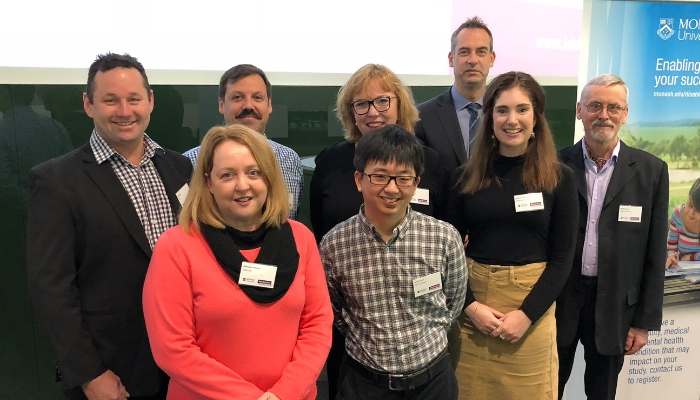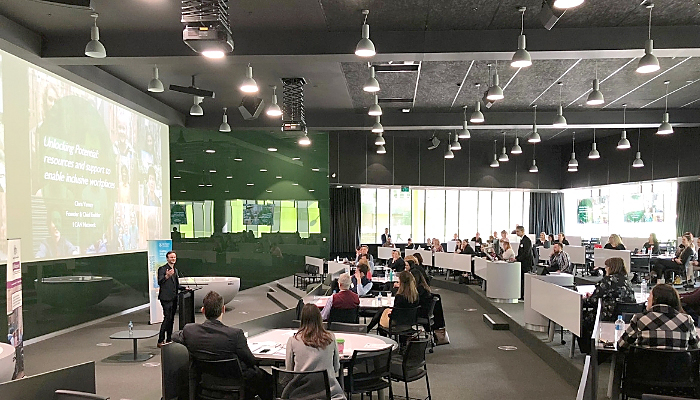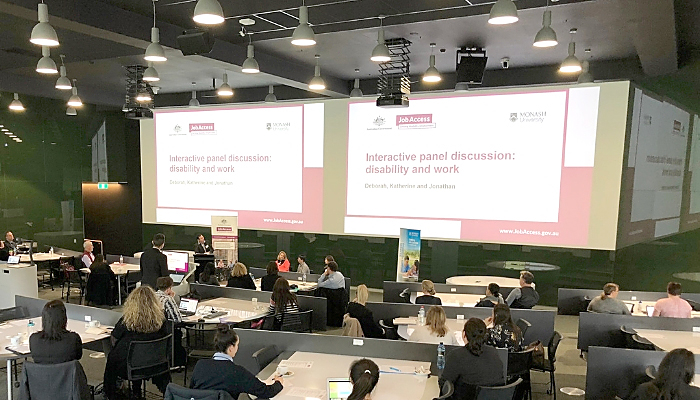Unlocking Potential: resources and support to enable inclusive workplaces

Photo (clockwise): Don Elgin, Daniel Valiente-Riedl, Jennie Huxley, Marcus Pettinato, Matthew Salas, Katherine Allman, Jonathan Lee and Deborah Fairbairn at the JobAccess Employer Seminar at Monash University
Event wrap: Open conversations key to unlocking full potential of disability employment
Melbourne, 12 September 2018
Encouraging open and honest conversations is vital to realise the full potential of employees, including those with disability. Industry experts, employers and panellists underlined this message at a JobAccess employer seminar held in Melbourne on 12 September - ‘Unlocking Potential: resources and support to enable inclusive workplaces’. Organised in collaboration with Monash University, the seminar saw over 60 employers across different sectors explore and discuss the benefits of a diverse and inclusive workplace. Key takeaways from the event included:
Building disability confidence is teamwork
Keynote speaker Chris Varney, CEO of I CAN Network, said that employers hiring people with disability could see a valuable difference when going beyond their internal Culture, Diversity and HR teams to equip senior management and other departments with the tools to make workplaces more accessible and disability confident.
Chris shared that 60% of adults with autism in Australia are unemployed, while 8 in 10 kids and teens with autism experience difficulty in schools. He highlighted that the challenges people with autism face arise from misconceptions about their intellectual and emotional capabilities which lock them away into ‘high functioning’ or ‘low functioning’ categories. “When you call someone low functioning they are assumed to be incompetent, which is incorrect,” Chris said.
People on the autism spectrum bring different skills, abilities and perspectives to the workplace and have a lot to offer. Providing validation, emotional assurance and giving some level of control can make a world of difference to help an employee with autism reduce anxiety and perform at their best.

Photo: Chris Varney, CEO of I CAN Network, addressing the audience
Go beyond a tick in the box
The seminar panel through their shared experiences threw light on steps employers can take to ensure people with disability are supported in the workplace – right from submitting a job application to supporting employee performance in the role.
Katherine Allman, Entrepreneurial Operations Officer at Monash Generator, shared her nervousness when applying for her first full-time role. “The online application had a checkbox asking ‘do you have a disability’ and then a box to provide further details, so I left it unchecked.” In a majority of cases, there is a certain idea of what disability looks like, and it can be difficult if one doesn’t fit the narrative. “Initially, I struggled because my disability is invisible, therefore that it wasn’t a ‘real’ disability.” Over time, Katherine’s hesitation was replaced by confidence to talk about her disability. She believes open discussions at the workplace are essential. “What’s crucial is to start a dialogue. It’s going to be shaky at first, but don’t be afraid.”
Environmental Sustainability Assistant at CPB Contractors Jonathan Lee said employers require an attitudinal change towards people with disability and should be more empathetic. He shared his experience of how effective communication overcame workplace discrimination. An open and honest conversation between Jonathan and his current manager about his skills, passions and abilities allowed them to realise his full potential, and his skills are now utilised effectively at work.
Deborah Fairbairn, Client Support Adviser with JobAccess, said being able to have a conversation with her employer has helped her achieve success in the current role. Reflecting on her experience, Deborah said “There have been several roles I had applied for in a different organisation that required me to disclose my disability. Unfortunately, this led to a presumption by the employer that it would be too difficult to provide workplace adjustments based on their understanding of my disability without them speaking with me.”

Photo: Seminar panel in progress
Steer away from stereotyping
Jennie Huxley, National Workforce Planning Officer at Spotless Group (a JobAccess Alumni partner), said stereotyping is one of the main reasons people with disability don’t get the right opportunities. “None of us like to be pigeonholed based on one aspect of our identity.” She explained the importance of education and disability training to empower managers to understand better how they can support employees with disability in the workplace. “Don’t make assumptions about how the role will be done, but rather focus on the outcome of the role.”
Embrace a positive outlook
Matthew Salas, Senior Disability Adviser - Disability Support Services at Monash University highlighted the institution’s commitment to diversity and inclusion. He shared Monash’s efforts in building a disability and diversity-inclusive environment from 1975 when a group of university parents raised $200 towards a cassette deck to record orientation week activities for the benefit of blind students and staff. The university has ambitious plans for the future with a progressive and optimistic outlook.
Concluding the seminar, MC Don Elgin, triple Paralympic Medallist and Athlete Manager, recounted a conversation with fellow Australian Olympic high jumper Tim Forsyth. When asked about the highest jump he aims to reach, Tim replied: “I’m not willing to put a cap on my potential.”
Last updated:
